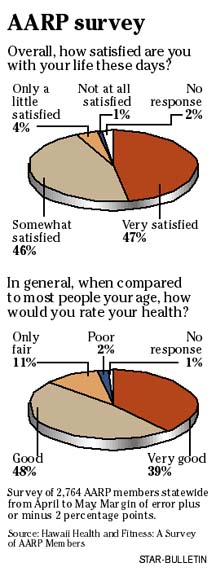
COURTESY OF AARP
Local senior citizens exercise during an AARP workshop. A new survey found 75 percent of 2,764 seniors said moderate exercise is very important for staying healthy.
Hawaii’s seniors
generally feel fitA recent survey shows retirees
acknowledge exercise as important
A survey of Hawaii residents age 50 or older indicates they are generally satisfied with their lives, and most feel their health is good.
However, 27 percent consider themselves sedentary, even though most would like to be involved in some type of physical activity.
These were among findings reported by Hawaii AARP yesterday based on a random health and fitness survey conducted in March and April. Surveys were mailed to 5,000 AARP members on all islands, and 2,764 (55 percent) returned usable responses.
Nearly half (47 percent) said they are "very satisfied" with their life, while 87 percent ranked their health as "very good" or "good," according to a report prepared by Jennifer Sauer, of AARP's Washington, D.C., office.
"Men and women are equally as likely to say they are very satisfied with their life," she said.
Members of AARP, formerly known as the American Association of Retired Persons, are age 50 and older.
The survey found that older members, 60 to 75, were more likely than those younger to be very satisfied with their lives.
Members said the major ways to stay healthy are eating right, getting regular health exams, reducing stress, maintaining a healthy weight and getting enough exercise.
About 75 percent said moderate exercise is very important for seniors to be healthy, and more than 58 percent said people their age should exercise three or four times a week. They prefer walking outside or on a track, gardening, working out on cardiovascular machines or weightlifting.
About 74 percent said they exercise outdoors; 57 percent usually exercise alone and 53 percent exercise at home. About 76 percent exercise for at least 30 minutes.
About half of nonexercisers feel they should get some physical activity, but "they feel a class or gym membership is too expensive (23 percent) or they do not seem to be able to get around to exercising (23 percent)," the survey showed.
About 11 percent cite health reasons for not exercising. Other reasons given are tiredness or lack of energy (12 percent), family obligations (10 percent), exercising alone (9 percent) and difficulty fitting exercise into their life (9 percent).
AARP Hawaii scheduled a series of free workshops this month on all major islands to help members become physically active. Registration for the workshops closed after more than 800 seniors signed up.
Gerontologist Tony Lenzer, an AARP volunteer and advocacy team member, said, "Most Americans know the benefits of physical activity, but few realize that doing as little as 10 minutes of activity, three times a day, can really improve health and well-being."
He said the workshops, which began Saturday, were to help people "get started on easy and enjoyable activities they can do every day."
The workshops were intended to help prepare participants for Shape Up Across Hawaii, which challenges seniors to participate in a 400-mile virtual journey across the state. AARP Hawaii is sponsoring the event from July through October.
Participants count the minutes walking, running, surfing, gardening, dancing or using a wheelchair and count them as miles in the journey. Certificates will be given to participants who complete the 400 miles.
Group activities also will be hosted by community agencies and organizations during the program.
To sign up, log onto www.shapeuphawaii.org, or pick up copies of the miles grids at the following locations: on Maui, the Kaunoa Senior Center, 401 Alakapa Place, Paia, phone 661-0159; or at these AARP Information Centers: Oahu, 1199 Dillingham Blvd., Suite A-106, phone 843-1906; Kauai, 4212-A Rice St., Lihue, phone 246-4500; and the Big Island, Royal Kona Resort, Kailua-Kona, phone 334-1212.
The workshops were developed by the American Association for Active Lifestyles and Fitness and National Senior Games Association and funded by the AARP and Centers for Disease Control.

